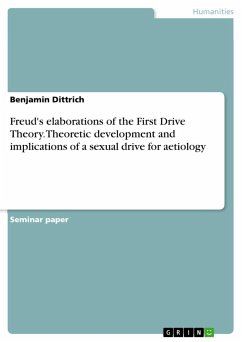Seminar paper from the year 2018 in the subject Psychology - Social Psychology, grade: 1,0, International Psychoanalytic University, language: English, abstract: In this essay the author wants to outline several aspects of Freud's first drive theory, to show his theoretic development and light up the implications of the assumption of a sexual drive for aetiology of neuroses and culture. Therefore he will focus on Freud's Interpretation of Dreams (1900a) and his Three Essays on the Theory of Sexuality (1905d). Furthermore he wants to address the difference between Freud's elaborations and the understanding of psychoanalysis today, using ideas of Müller-Pozzi (2008) for an example.Unsolved problems of psychopathology led Freud to a theoretic elaboration about the foundations of human psyche. As neuropathologist he held on a biologic concept on addressing the human psyche before 1900. In the new century he was a pioneer of a genetic psychology. According to Sulloway, "Freud established perhaps the most comprehensive evolutionary explanation of the origins of human behaviour that has yet been formulated in science". During the phase from 1892 to 1895 Freud established an aetiology of neurasthenia and anxiety neurosis, that is specifically sexual. His ideas of sexuality in this time are close to the scientific mainstream of late nineteenth century. Since neurasthenia was a well-known syndrome, sexuality was seen as one aetiological factor. But Freud supposed sexuality as the only reason for neurasthenia. The aetiological view that sexuality, and later on the sexual drive, plays the major role in aetiology of neurosis is a posit that Freud held on in his complete works. He justified this with his clinical experience, though he always noticed other influences, especially hereditary.
Hinweis: Dieser Artikel kann nur an eine deutsche Lieferadresse ausgeliefert werden.
Hinweis: Dieser Artikel kann nur an eine deutsche Lieferadresse ausgeliefert werden.








